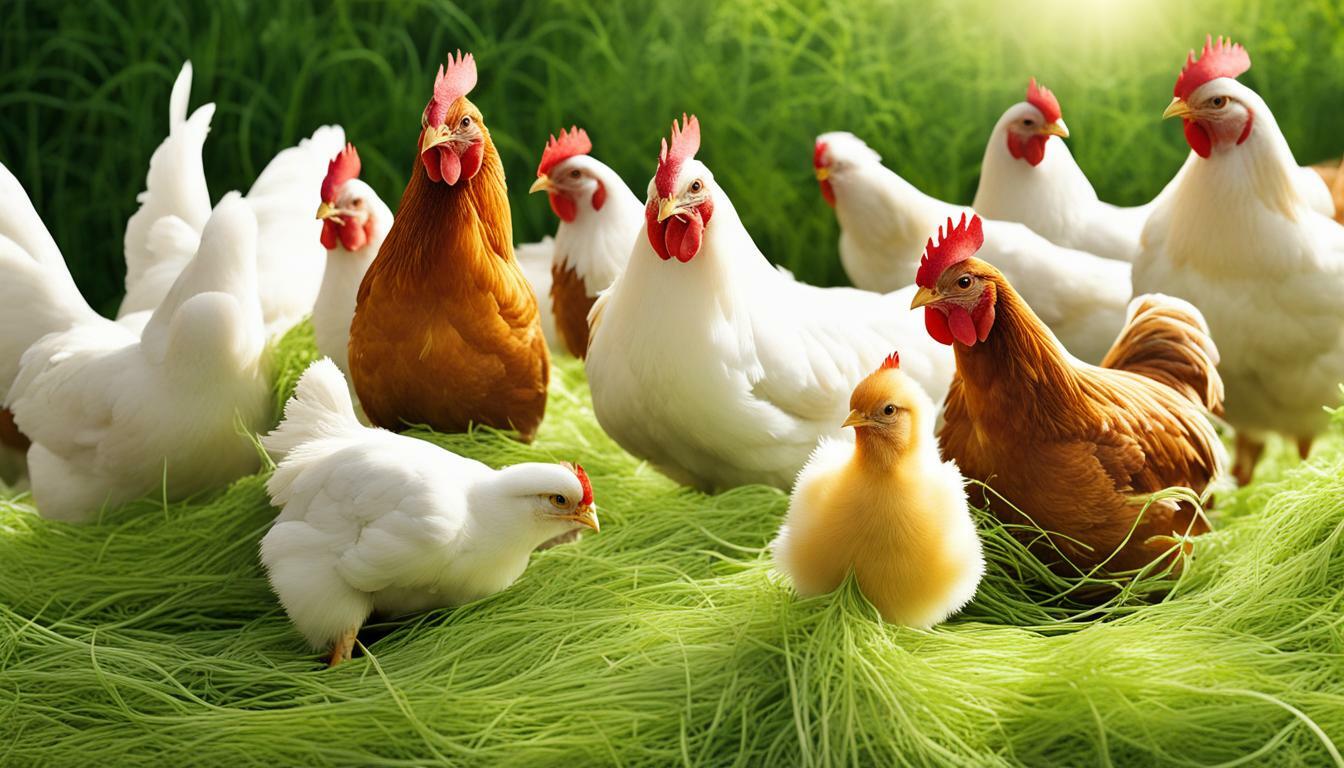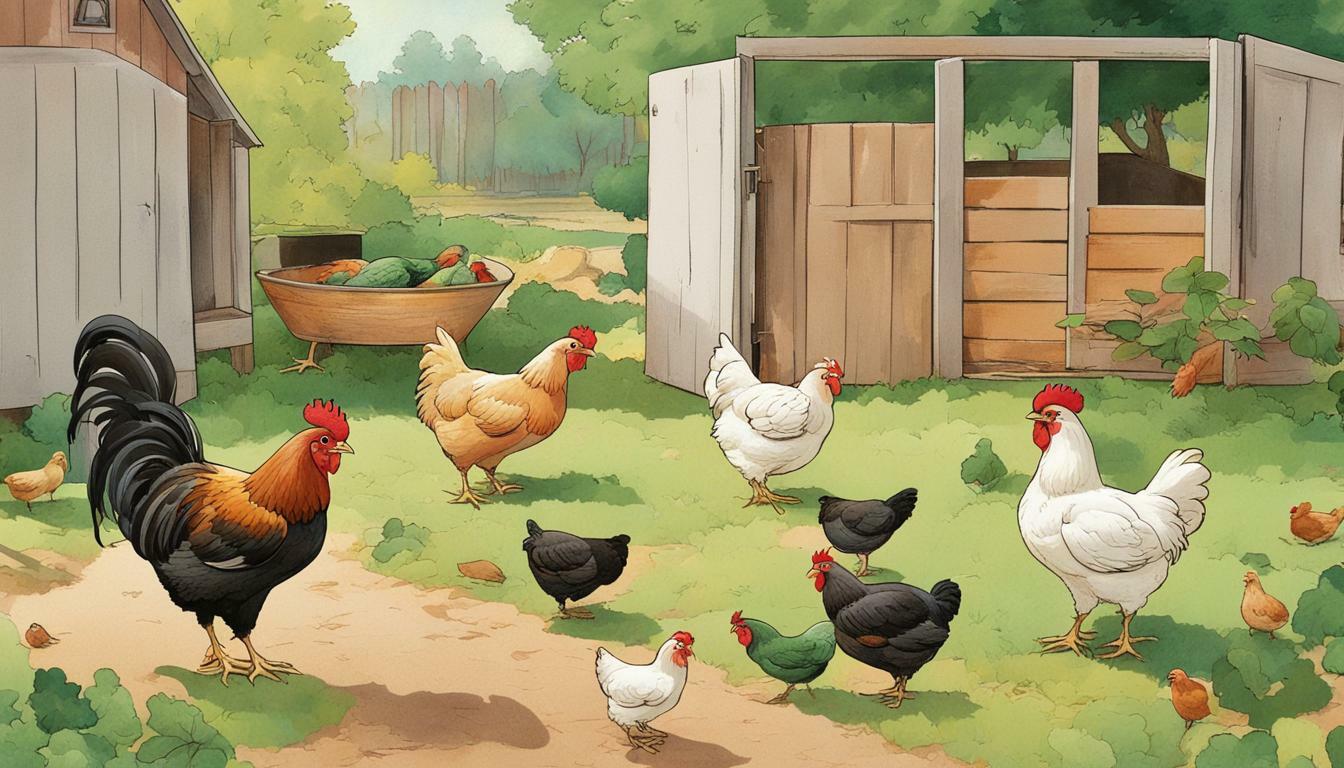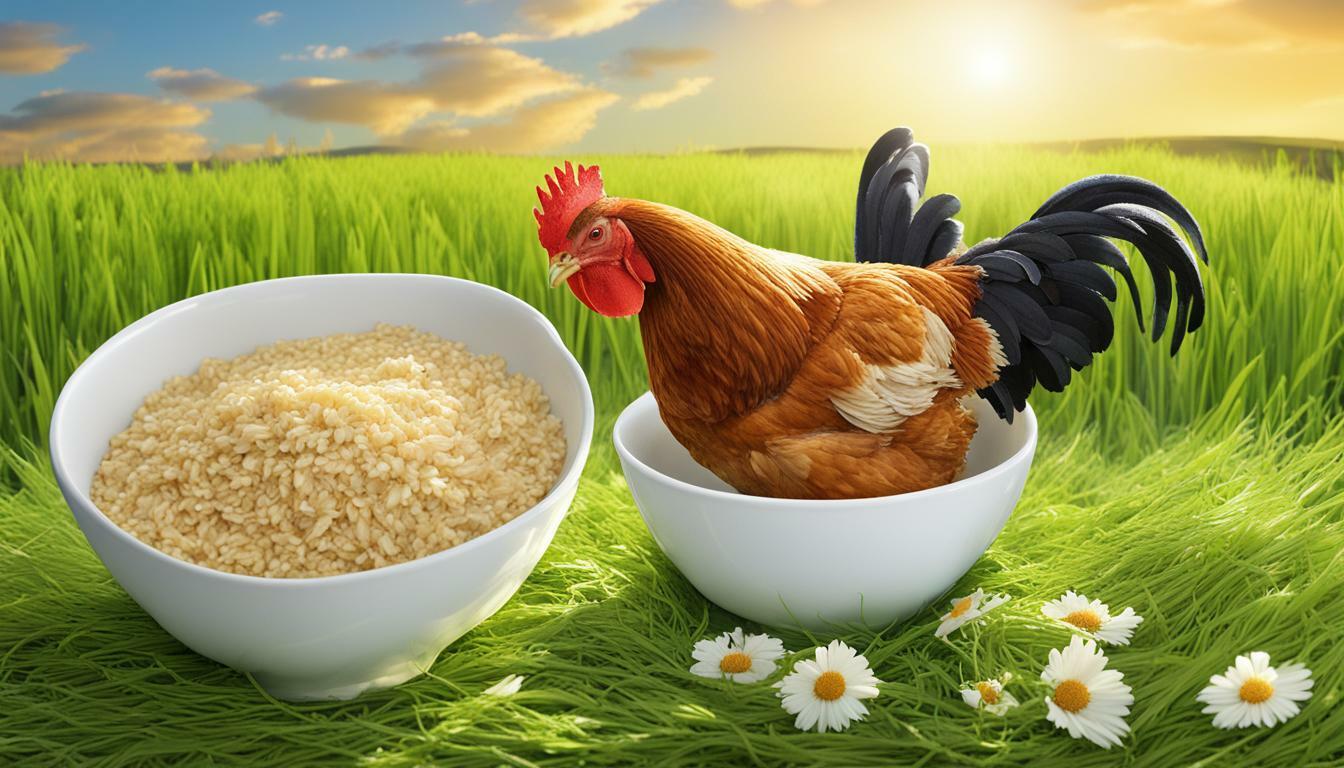Can Chickens Eat Blueberries?
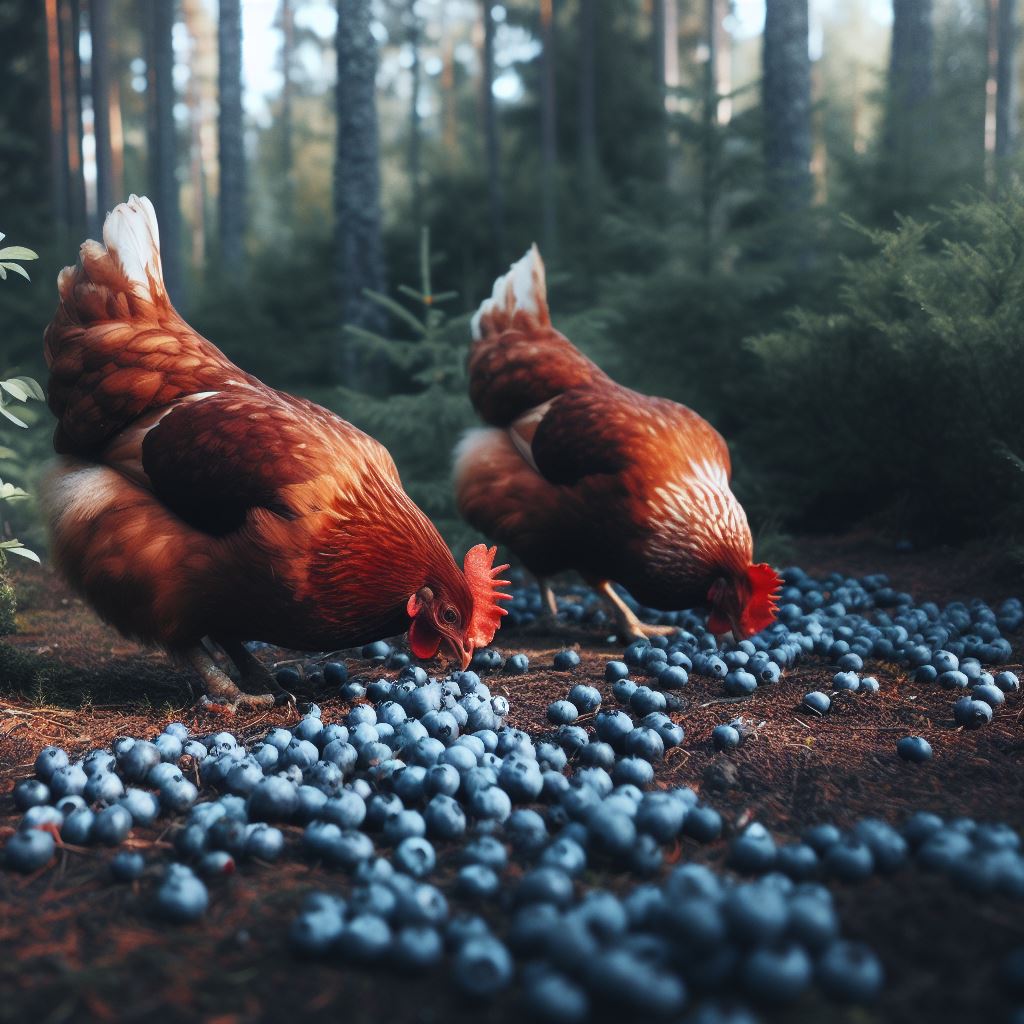
Table of content:
Blueberries are a nutritious snack that can offer some great health benefits for chickens. As with any treat, moderation is key when feeding blueberries to chickens. This article will explore whether chickens can eat blueberries, the benefits blueberries provide for chickens, how much to feed them, and any potential downsides.
Feeding Blueberries to Chickens
Blueberries contain antioxidants, vitamin C, fiber and phytochemicals. This makes them a healthy treatment option for chickens in moderation. However, too many blueberries can lead to loose droppings, diarrhea, or upset stomachs. Understanding proper blueberry feeding guidelines can help chicken owners provide this nutritious snack safely.
 Are Blueberries Safe for Chickens to Eat?
Are Blueberries Safe for Chickens to Eat?
Yes, chickens can safely eat blueberries as an occasional treat. Blueberries do not contain any toxins that are harmful to chickens. The fruits are not poisonous or unsafe. In fact, blueberries offer some great nutritional benefits.
Health Benefits of Blueberries for Chickens
Here are some of the key benefits blueberries can offer chickens:
- Antioxidants – Blueberries contain antioxidants called anthocyanins. These help combat free radicals and oxidative stress. This supports immune system health in chickens.
- Vitamin C – Blueberries provide vitamin C, an essential vitamin for chickens. Vitamin C supports immune function and bone health.
- Fiber – The fiber in blueberries supports healthy digestion and gut function in chickens. Fiber can also help prevent loose droppings.
- Phytochemicals – Blueberries contain phytochemicals like flavonoids and phenolic acids. These plant compounds offer anti-inflammatory effects.
So in moderation, blueberries can be a nutritious snack for chickens that provides important vitamins, minerals, antioxidants and fiber.
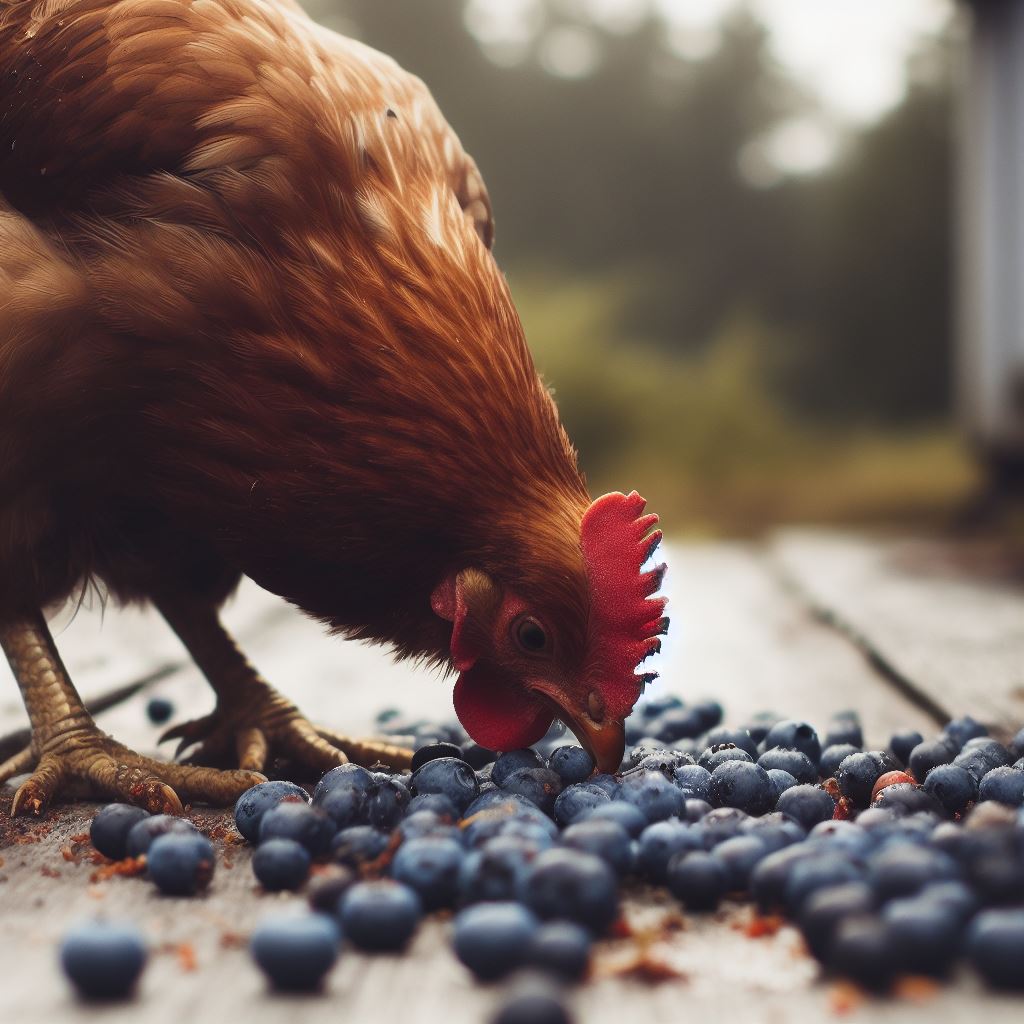 Are There Any Downsides to Feeding Chickens Blueberries?
Are There Any Downsides to Feeding Chickens Blueberries?
While blueberries offer great nutritional benefits, some potential downsides of feeding too many blueberries include:
- Diarrhea or loose droppings from too much sugar and fiber
- Upset stomach if chickens eat too many
- Weight gain if overfed
- Lack of balanced nutrition if too many treats are given
That’s why moderation is key when offering blueberries or any treat to chickens.
How Many Blueberries Can Chickens Eat?
When feeding blueberries to chickens, how much is too much? Follow these guidelines for amounts:
- 2-3 blueberries per chicken: Offer 2-3 berries 1-2 times per week as a treat. This gives chickens a taste without overfeeding.
- 1⁄4 cup per chicken: Up to 1⁄4 cup of blueberries 1-2 times a week is safe for most chickens if broken up into multiple small feedings.
- Avoid free feeding: Do not leave bowls of berries out for chickens to free feed. This can lead to overconsumption and diarrhea.
- Adjust amounts as needed: Start with small amounts and increase slowly while monitoring chickens’ droppings for any diarrhea. Reduce quantities if looseness occurs.
Watch your chickens’ consumption and droppings for signs of overfeeding when offering blueberries. Adjust amounts downward if any diarrhea occurs. Moderation is important.
How Often Can I Offer Blueberries to Chickens?
Offer blueberries in moderation 1-2 times per week at most. Chickens do not need blueberries every day. As an occasional treat, 1-2 times is sufficient to provide health benefits without overfeeding.
Daily treats can lead to an unbalanced diet and weight gain. Mix up treats like blueberries, chopped greens, mealworms, fruits, and veggies for variety.
Signs Your Chicken Is Eating Too Many Blueberries
Watch for these signs your chicken may be getting too many blueberries:
- Loose, watery droppings
- Diarrhea
- Lack of appetite for layer feed
- Reduced egg production
- Increased thirst and urination
- Weight gain
- Lethargy
- Blue staining around beak
Reduce blueberry amounts and frequency if any of these occur. The blueberry antioxidants can turn droppings and beak slightly blue, which is harmless, but monitor for other signs of overconsumption.
Can Chicks or Baby Chickens Eat Blueberries?
Blueberries can be fed to chicks over 8 weeks old in small quantities. Avoid offering blueberries to younger chicks. Wait until chicks are fully feathered and eating layer feed well. Then introduce a few berries at a time.
How Should I Feed Blueberries to Chickens?
Here are some tips for feeding blueberries:
- Chop berries into small pieces to prevent choking hazards
- Mix into chickens’ feed, or offer separately after they finish eating
- Scatter berries in yard or pasture area to encourage natural foraging
- Use as training treats for any handled chickens
- Avoid leaving berries to accumulate and rot in dish or yard
Should Blueberries Replace Chicken Feed?
No, blueberries should never replace formulated layer feed. Layer feed provides balanced nutrition that chickens need for eggshell production and health.
Treats like blueberries can supplement feed, but not act as the sole food source. Always ensure chickens have access to layer feed and fresh water too.
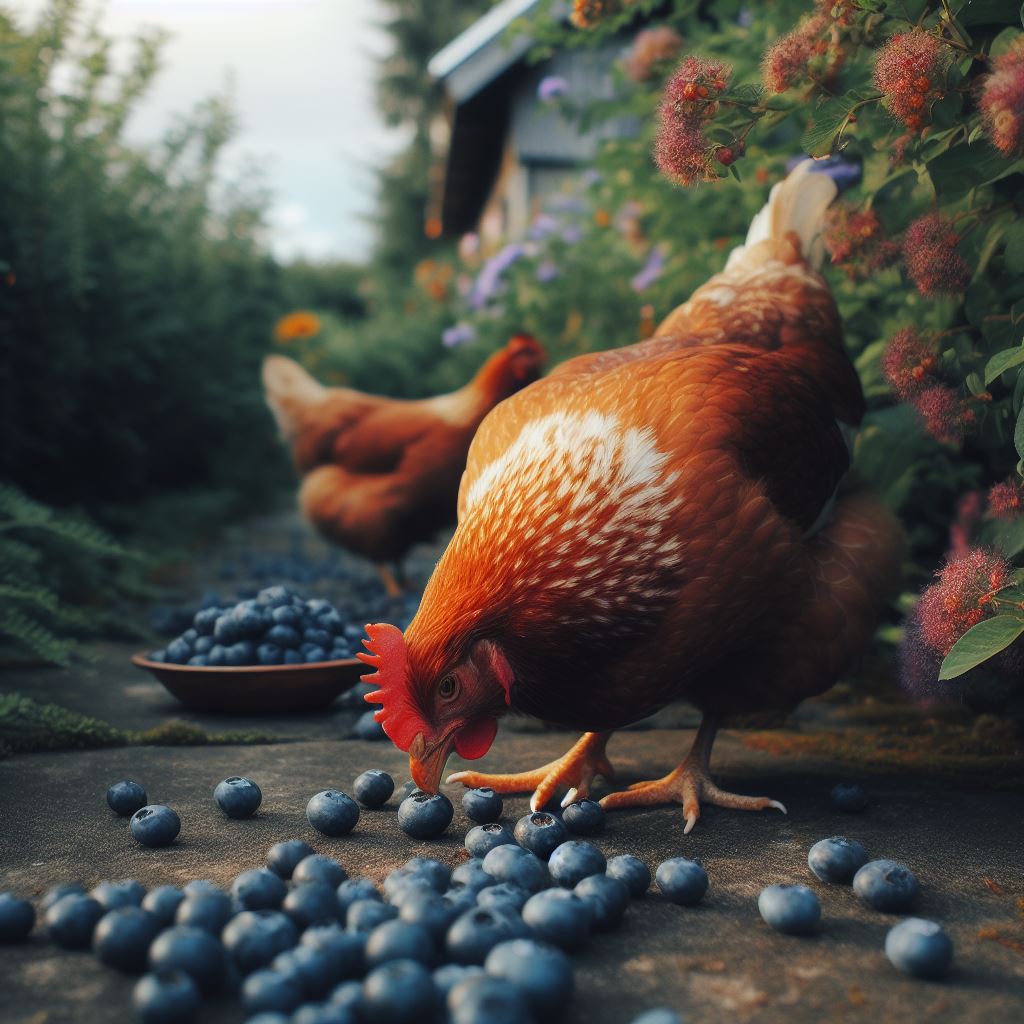 Are There Any Risks With Feeding Chickens Blueberries?
Are There Any Risks With Feeding Chickens Blueberries?
Feeding blueberries infrequently and in moderation comes with very little risk for chickens. However, some precautions include:
1. Choking Hazard
Whole blueberries could potentially lodge in a chicken’s throat leading to choking. To prevent this, always chop berries into bite-sized pieces before feeding. Avoid letting chickens scarf down whole berries.
2. Diarrhea and Digestive Issues
Too many blueberries may loosen chickens’ droppings or cause diarrhea. Sugar content and fiber can both contribute to looseness. Start with small amounts and increase slowly while monitoring chickens’ droppings. Reduce quantity if diarrhea occurs.
3. Weight Gain
Blueberries are high in natural sugar. Overfeeding them can lead to excess calories and weight gain in chickens. Obesity can cause egg laying issues and health problems. Monitor chickens’ body condition and limit high-calorie treats.
4. Unbalanced Nutrition
Replacing too much feed with blueberries may reduce intake of balanced layer feed nutrition. Chickens can miss out on protein, vitamins and minerals they need if too many treats displace meals.
5. Moldy Berries
Leaving blueberries out in the open can cause them to spoil and mold. Only feed fresh, firm berries. Discard any leftovers promptly. Don’t allow rotten berries that could grow mold.
By using proper blueberry feeding guidelines and amounts, these risks can be avoided. Moderation is essential.
Frequently Asked Questions About Feeding Blueberries to Chickens
Here are answers to some common questions chicken owners have about feeding blueberries:
What kind of blueberries can I feed chickens?
You can feed chickens all varieties of blueberries – wild, cultivated, organic, etc. Opt for fresher berries whenever possible. Avoid spoiled, mushy berries.
Can I feed chickens freeze-dried blueberries?
Yes, freeze dried blueberry pieces are safe for chickens too. Crumble any large pieces to reduce choking risk. Rehydrate before feeding if possible.
Do I need to wash blueberries before feeding chickens?
Washing blueberries helps remove any pesticide residue, dirt or debris. Pat dry before feeding to chickens.
Can chickens eat blueberry plants?
No. While blueberries are safe, the leaves, stems, and roots of the blueberry bush contain toxins that can be harmful. Avoid letting chickens access live blueberry plants.
What other berries can chickens eat?
Chickens can also eat other berry varieties like strawberries, raspberries, blackberries and cranberries in moderation. Offer a variety of antioxidants.
Can chicken eat blueberry jam?
Avoid feeding chickens sugary jams or jellies. The added sugar causes digestive upset. Offer plain fresh or frozen berries instead.
Do wild chickens eat blueberries?
Yes, wild chickens may forage on fallen ripe blueberries. The berries provide supplemental nutrition and antioxidants.
Conclusion
In conclusion, blueberries are a nutritious fruit that offers benefits like vitamin C, antioxidants and fiber for chickens.
A few berries 1-2 times per week make a great treat. Take care not to overfeed, and monitor chickens for signs of diarrhea or weight gain.
Always feed fresh, chopped blueberries in moderation along with a balanced diet. With proper blueberry feeding guidance, chickens can safely enjoy this refreshing, healthy snack.
Welcome. I’m Adreena Shanum, the proud owner of this website, and I am incredibly passionate about animals, especially poultry. I founded adreenapets.com as a labor of love, stemming from my desire to share my knowledge and experiences with poultry enthusiasts worldwide.


